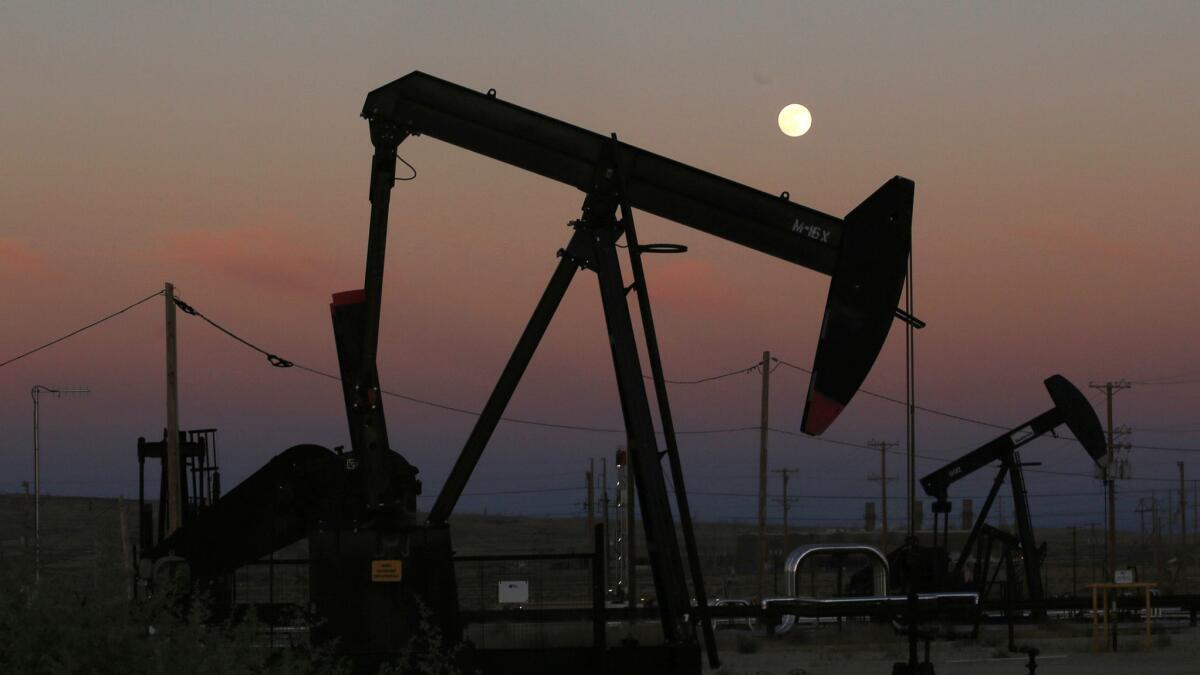Oil prices take a new dive as coronavirus wipes out demand

The price of U.S. crude oil for June delivery fell by almost half Tuesday, and Brent, the international benchmark, dropped below $20 a barrel for the first time in 18 years as global oil markets remained under intense pressure.
The value of West Texas Intermediate crude for delivery in June — which had held above $20 a barrel Monday even as the May contract traded at an unprecedented negative price — slumped to $6.50 a barrel at its worst, before recovering somewhat to settle at $11.57, down 43%.
The move suggested the blowout in the May contract was more than just a technical blip, and it reflected growing concern that U.S. storage facilities will fill up unless energy demand quickly rebounds from its coronavirus-related collapse.
Brent crude, meanwhile, extended its fall in afternoon trading in New York, touching a fresh low of $17.51 a barrel before recovering slightly to settle at $19.33 a barrel, down 24% on the day.
The coronavirus pandemic has sent the oil sector into a state of crisis. Closures of businesses and restrictions on travel, meant to slow the spread of the virus, have slashed global demand for crude by as much as a third this month compared with pre-crisis levels.
Meanwhile, U.S. oil production has remained robust even though storage tanks are just weeks away from reaching capacity. The plunge below zero was in part the result of traders seeking to offload any obligations to accept physical oil — and figure out where to store it — before the May contract’s Tuesday expiration date.
The May contract tumbled as low as negative $40 a barrel Monday, marking the first time it had fallen into negative territory. It rose Tuesday to $10.01 a barrel.
“The contagion has spilled over” to the June contract, “which could also be well on [its] way into the red as we move towards physical delivery dates,” said Louise Dickson, an analyst at Rystad Energy.
Plans for unprecedented supply cuts by some of the world’s biggest producers such as Saudi Arabia and Russia have so far failed to offset the tumble in oil demand.
Fatih Birol, head of the International Energy Agency, said Tuesday that the reductions, set to start taking effect next month, were “insufficient to rebalance the market immediately due to the scale of the drop in demand.” He called for countries that have committed to supply cuts to enact them as soon as possible and suggested they consider deepening them.
Meanwhile, officials and OPEC delegates sought to talk up the market. Saudi Arabia said Tuesday that it was prepared to take additional measures, alongside other producers that are part of the OPEC+ alliance, to prop up the oil market and achieve market stability. Iran’s state news agency cited a cabinet statement saying the kingdom “is committed with Russia to implement production cuts over next couple of years.”
Russia downplayed the collapse in crude prices, saying there was no need to view it as an “apocalyptic” event after the nation’s Ural blend, which is loosely based on Brent, fell to its lowest level since 2002.
“The chaos with futures is absolutely speculative, just a trading issue,” Kremlin spokesman Dmitry Peskov said. “Of course there is no need to give this an apocalyptic hue.”
The oil collapse has also underscored the powerlessness of President Trump, who had pressured Saudi Arabia and Russia to agree to supply curbs in a bid to support the U.S. shale industry.
On Tuesday Trump said on Twitter he had told the Energy and Treasury secretaries to “formulate a plan” to make funds available to energy producers so as to secure those companies and their jobs “long into the future.”
© The Financial Times Limited 2020. All Rights Reserved. FT and Financial Times are trademarks of the Financial Times Ltd. Not to be redistributed, copied or modified in any way.
More to Read
Inside the business of entertainment
The Wide Shot brings you news, analysis and insights on everything from streaming wars to production — and what it all means for the future.
You may occasionally receive promotional content from the Los Angeles Times.










